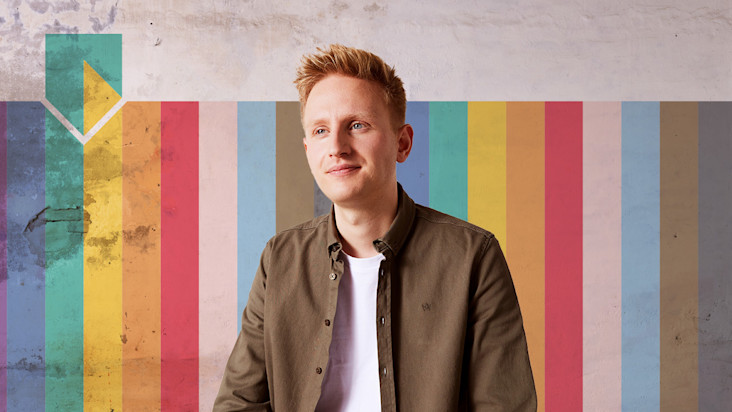Colleague Thomas: “In the last job I had, I was surrounded by gays.”

- Diversity and inclusion
Our colleague Thomas has a boyfriend and is a board member of the bank’s LGBTI+ network: PRIDE+. “In a few years’ time, all those pigeonholes should be gone.” We’re a bank that strives for a culture in which everyone can be themselves. But do we manage that, and if so, to what extent? In the context of Pride 2022, we talk about this with Thomas.
What do equal opportunities mean to you?
“That everyone has the opportunity to be their best self and to grow. Regardless of where you were born, your skin colour, what body you have, who you like, your education, your religion...”
Have you ever experienced inequality?
“In recent years, I’ve had little trouble with this. I live in Amsterdam, and I can be myself there, whether I’m with my friends or at work. When I was 16 or 17, I used to cycle with two girls, after going out, to their house in the next village. For me, it was quite out of the way, but as girls they didn’t dare to be on the streets on their own at night, and I understood that. I later heard that one of their mothers had said: ‘Oh, did Thomas bring you home? There was no need for that, because he’s not a real man anyway.’ My mother in particular was furious at this, at how someone could talk like that about another person, especially after they’d done something nice for her daughter. Before I joined the bank, I worked on the editorial board of Winq, a queer magazine. I was surrounded by gays there. It’s quite different here at the bank, but all colleagues are ready to hear my story. Sometimes there are gaps in people’s knowledge, but there’s certainly the willingness to understand. I can’t separate the way things are here in the Netherlands from the places in the world where being gay is really dangerous...I’m only too aware of the problems in other countries.”
How do you deal with inequality?
“Well I’m not one to get up on my soapbox. That’s just not my thing. But I’m delighted there are people who do hit the streets when they have to, because it’s really important. I’m one to get the conversation going. As a board member of PRIDE+, the bank’s LGBTI+ network, I like to share knowledge about all kinds of things that LGBTI+ folks are involved in. What we do as a network affects the lives of people involved in the community. If we see any indications of inequality at work, or hear about inappropriate behaviour by colleagues in response to someone’s sexual orientation, we listen and can, for example, engage in discussion with colleagues or managers. We’re not here to take on the role of our diversity & inclusion colleagues, but we do like to share what we know about specific topics. Sexuality and gender identity are sensitive topics that involve a lot of different factors. Above all, we’re a friendly community where you can meet like-minded people, go to talks, and have drinks. In my current job, I fight inequality by ensuring that people don’t feel excluded, for example through gender-neutral job ads and social media posts. I show people what other person’s perception is like.”

Why are equal opportunities important?
“My great-aunt is a lesbian, but for years her parents said she lived with a ‘female friend’. Now I can just tell my grandparents that I have a boyfriend and they’ll ask questions out of interest. My parents were on one of the boats during the Pride event in my hometown the other day, and didn’t even mention it to me because it’s already so normal for us. If I’d been born a hundred years ago, my life would’ve been so different. If we can get away from seeing each other in pigeonholes such as gay, transgender, non-binary or what have you, we’ll all be that much happier, not only the people who are directly affected, but also the people around them. Only when everyone has equal opportunities will we realise everyone’s full potential and be better off as a society.”
How can we achieve equal opportunities?
“By looking less at how someone looks on the outside and more at what they’re like as a person. We have to have the courage to try to eliminate prejudice. That’s easier said than done, so we have to help each other. For example, not everyone knows what non-binary really means, or that non-binary people want to be addressed with a different pronoun. Non-binary people often have to explain themselves. However, once this information is out there, it’s easier for everyone to feel at ease. We have to keep ‘pushing’ the conversation in the right direction, and in a nice way. In a few years’ time, all those pigeonholes should be gone.”
This interview is part of a series of interviews about equal opportunities, in which we talk to various colleagues about the obstacles that we still need to overcome, both as a bank and as a society.With our comprehensive diversity and inclusion policy, we give special attention to women, the LGBTI+ community, people with occupational disabilities, people from different cultural backgrounds, and senior citizens. For Pride 2022, we asked four employees from the LGBTI+ community five questions about equal opportunities.